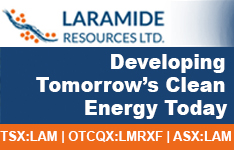Marshall Adkins: There's no set number. It's a graduated scale that becomes more painful, and then demand suffers more as prices rise. But many other variables also go into that calculation; when new all-time highs are set, it seems more painful than revisiting old highs. In 2008, for example, we saw oil prices ramp-up to $145/barrel. As the price rose from $100–$145/bbl., we saw meaningful destruction in U.S. demand for oil and oil products. But because we've already been there, I wouldn't expect to see as great a demand reduction at the same price levels we saw in 2008. So, it's both a function of absolute price and how long it stays at that price. But, summarizing that into a more succinct answer, I would say that as we move up into the low $100s, we'll start seeing it cramp U.S. consumption. I'm focusing just on the U.S. here because, given the devaluation of the U.S. dollar and numerous other currencies, many countries don't actually see the same oil price increases we're seeing here; so, you get a whole different pricing dynamic there.
Switching to gasoline, what I find interesting is that if we go back to '08 when gasoline prices surged to the $3/gallon range, we saw CNN and all the news networks interviewing disgruntled consumers at the gas pump who were eager to blame evil oil companies for the high prices. It was in the news every day, and people were acutely aware of gas surging to $3/gallon and the pain it inflicted upon the economy. Here we are above $3/gallon again—at roughly $3.15 depending on where you are—and nobody's interviewing people at the gas pump. So, it just doesn't seem as painful a situation now that we're again pushing toward $100/bbl. crude right now.
TER: Once you've tested those levels, you don't have the shock value anymore.
MA: Yes. The shock value is certainly lower, no doubt. That also brings up another important point. When we quote oil prices today, we're quoting West Texas Intermediate, which is priced out of the Cushing hub in central Oklahoma. Currently, there's a meaningful bottleneck of supply in the middle of North America. We have a lot of increased oil production out of Canada, the Bakken and the Permian Basin that all congregate in Cushing, Oklahoma; and at the current time, we don't possess the ability to really move that oil out.
So, Cushing and WTI are trading at a huge discount to all other oil prices around the world. In fact, there was an unprecedented $17 discount between WTI and Brent at the February 17 close. So, you've got to be careful about what price we refer to today because there's a massive disconnect from what we normally look at. Now, gasoline prices are going to be more closely related to the global price of crude, which is well over $100/bbl. right now in almost every area, and that's driving the roughly $3.15/gallon gasoline number. It doesn't seem to be a major impediment, yet; but in '08 as we went through these same levels, demand growth was already beginning to slow meaningfully due to pricing.
TER: What about arbitrage opportunities between WTI and, say, Brent? Are there opportunities like that for investors?
MA: No, because the problem is structural in nature. The average investor can't take advantage of structural imbalance. Now, the companies involved with transporting oil will look at that price differential and ultimately react by building more takeaway capacity. However, this is very similar to the disconnect that occurred in Rocky Mountain natural gas prices 5–10 years ago where prices always traded at a huge discount in the Rockies versus Henry Hub because there wasn't takeaway capacity. Once we built the Rocky Mountain Express Pipeline, we saw equilibration between the two. So, once you build the pipeline takeaway capacity, that arbitrage (arb) opportunity will disappear.
TER: Do rising oil prices inflict as much pain on China's economy as they do on North American and other economies?
MA: Sure, energy is essentially a tax on the economy whether it's U.S. or Chinese. Obviously, to the extent that China allows the yuan to appreciate versus the USD, it doesn't see the same pressure we do in percentage terms. But, yes, it's going to be a drag on China's economy as prices go higher. The difference between the U.S. and China right now is that it's seeing meaningful inflation across the board, a lot of which is driven by high energy prices.
TER: At what level do we see the price of energy putting enough pressure on the economic structure to force us into alternative sources of energy?
MA: That's a really good question, and that's really the most important issue. At what price can we develop solar, wind and other sources of energy to offset the high prices? As a transportation fuel, there aren't a lot of short-term alternatives. Clearly, we're making a push toward electric vehicles (EVs) but at the end of the day those are still a long way off from being practical substitutes for gasoline- or diesel-powered cars and trucks.
So, what are the other alternatives? Solar, at $150/bbl. oil, certainly works; wind, maybe not quite as much. But to the extent that you start to move up to the mid-$100 level, people will start to find alternatives. EVs will become more attractive, and people can afford to buy more expensive EVs and more expensive battery systems, etc. It's the same with solar and, to a lesser degree, wind. Yes, there will be alternatives that become more attractive and that's the way a free market economy should work. Prices will drive the rationality [of moving to alternative energy sources] and not political edicts that always seem to fail. So, there will be a solution to high oil prices—and that solution is high oil prices. It'll crimp short-term demand and it will allow alternative sources of energy to be exploited and brought to market on a long-term basis.
TER: Did you attend the North American Prospects Expo this year?
MA: Yes. It has obviously turned into a huge industry event. The exploration and production (E&P) business in the U.S. has been transformed on an unprecedented level over the last five years. What do I mean by that? On the natural gas side, well productivities are up a staggering amount. These horizontal gas wells are 5x–10x more productive per well than they were just five years ago. We're starting to see the same in U.S. oil formations where we're transforming our ability to reverse what has been a 30-year decline in U.S. onshore oil production. The application of horizontal and hydraulic-fracturing (fracking) technology has enabled us to access reserves that previously weren't accessible on an economic basis. The NAPE is just one offshoot of this larger phenomenon of a very healthy E&P business in the U.S., particularly on the oil side. That should continue unless the government creates impediments to it.
TER: Marshall, what's the outlook for capital spending in 2011?
MA: We think it'll be very robust on the oil side, up nicely. On the gas side, we think it'll be down just because we brought on so much gas that gas prices are going to be relatively depressed. So, it'll crimp the price flows on that side but oil is going to be very healthy. And we're looking for a modest increase in capex over the next year in the high single-digit range.
TER: Regarding gas, do you expect producers to quit drilling and explorers to quit exploring when leases begin to expire?
MA: First of all, the amount of drilling associated with leasehold activities is likely overstated by a lot of people. It's a piece—but not a very big piece—of the puzzle. What has surprised us over the last four months is the amount of drilling in dry gas areas like the Haynesville Shale, which we assumed would fall off very sharply. We're actually seeing an increase in the percentage of wells being drilled not to hold production, but rather being built on existing acreages already held by production despite weak gas prices. This is due to a combination of factors, including high liquids content in "oily" gas plays, which makes sub-$4 gas irrelevant, the fact that some gas plays work at $4 gas and the increase in joint venture (JV) agreements and pre-funded drilling programs. So, yes, the rig count will be sticky on the way down, despite relatively low gas prices. We don't expect a collapse in the gas rig count or gas-drilling activity.
TER: What about oilfield-service pricing? Is this a service provider's market?
MA: We're seeing pricing improve in anything related to horizontal drilling. Certainly, pricing has been very robust in pressure pumping and high-end land rigs are seeing solid price improvements. So, it's a relatively healthy environment, but not across the board—it's really more related to products and services associated with horizontal drilling activity and production.
TER: What did you think of President Obama's State of the Union address in January? He made some comments about energy independence.
MA: Well, we've obviously been targeting energy independence since the Carter days and yet we've done nothing but become more dependent on other sources. The reality is that it's very difficult for the government to mandate a change; change has to be backed up by financially based market incentives. Pure and simple, the energy consumer and/or producer will react when prices go up. So, leave it to the free market and this thing will solve itself over time. I think it's going to be very difficult for the government to mandate that we switch to a certain type of EV. It has never worked in the past. It won't work this time and it doesn't help to demonize the oil and gas companies, as that's where a lot of employment is coming from in a very low-employment environment.
Oil and gas are among the true natural assets we have here, and I thought Obama demonized the domestic energy business. In his State of the Union address, he noted that all of us could agree oil companies are making too much money. Since when does the president decide who makes too much money? Can we all agree that Apple makes too much money because it's a virtual monopoly? Maybe, maybe not—but I assure you, the margins and profits in the energy business are meaningfully lower than that of Apple or Microsoft, which the administration chooses not to demonize, yet. So, I think the goal is admirable but it has to be backed up by the market wanting and needing it. When that happens, change will occur and the government won't be able to mandate it successfully. It'll try because oftentimes the government thinks it's more powerful than it is; the market is the ultimate arbiter.
TER: Are there some companies that look particularly good to you now? Oilfield service, E&P, vertically integrated or whatever you'd like to discuss.
MA: I would like to stay focused on the area I cover, which is oil services. If I had to mention just one name, it would be National Oilwell Varco, Inc. (NYSE:NOV)—the world's dominant player in building energy infrastructure for drilling and exploration. NOV provides the equipment rigs used to drill around the world. Currently, the energy business is going through a massive reinvestment phase, replacing 20- to 30-year-old rigs with new technology and capabilities—and NOV is the go-to name for most people that want to build a new rig or new rig equipment. I think we're in the early stages of infrastructure buildout right now, and National Oilwell Varco will be the beneficiary of that buildout for many years to come. So, if I had to steer people to one, and only one, name it would probably be NOV.
TER: Are there any others you'd like to mention?
MA: We like the oil service and diversified companies—names like Halliburton Co. (NYSE:HAL), Weatherford International Ltd. (NYSE:WFT), Schlumberger Ltd. (NYSE:SLB) and Baker Hughes Inc. (NYSE:BHI). All these companies have excellent international exposure, which we see benefiting from the high oil prices around the world. We think that's a longer-term sustainable trend. These companies are not expensive when compared to the broader market, and they should grow earnings meaningfully higher than the broader market over the next five years. So, after NOV would be the diversified oil service companies.
TER: Last question—we've seen some increase in merger and acquisition (M&A) activity in the energy sector. Do you expect this to pick up?
MA: I don't know if it'll pick up because it's been awfully active recently, at least in the offshore drilling sector, with Ensco PLC (NYSE:ESV) buying Pride International Inc. (NYSE:PDE) and Hercules Offshore Inc.'s (NASDAQ:HERO) acquisition of Seahawk Drilling in recent weeks. Do we expect that to continue? Yes. I think we're going to see a lot of M&A and a lot of companies raising capital to facilitate future growth.
TER: Thank you, Marshall; I've enjoyed meeting you.
MA: Well, thank you for the time.
Marshall Adkins focuses on oilfield services and products, in addition to leading the Raymond James energy research team. He and his group have won a number of honors for stock-picking abilities over the past 15 years and the group is also well known for its deep insight into oil and gas fundamentals. Prior to joining Raymond James in 1995, he spent 10 years in the oilfield services industry as a project manager, corporate financial analyst, sales manager and engineer. Marshall holds a B.S. degree in petroleum engineering and an MBA from the University of Texas at Austin.
Additional companies under coverage: DWSN, ESV, EXLP, GOK, GGS, NE, SPN, CAM, CPX, HLX, NBR, PTEN, RDC, TTI, UNT
Want to read more exclusive Energy Report interviews like this? Sign up for our free e-newsletter, and you'll learn when new articles have been published. To see a list of recent interviews with industry analysts and commentators, visit our Expert Insights page.
DISCLOSURE:
1) George Mack of The Energy Report conducted this interview. He personally and/or his family own shares of the following companies mentioned in this interview: None.
2) The following companies mentioned in the interview are sponsors of The Energy Report: None.
3) Marshall Adkins: I personally and/or my family own shares of the following companies mentioned in this interview: None. I personally and/or my family am paid by the following companies mentioned in this interview: None.
















































